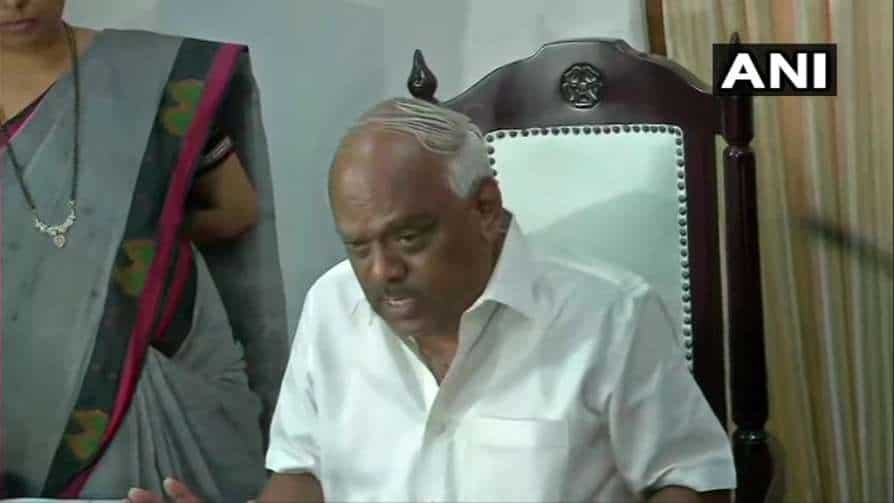Bengaluru: True to his style of functioning, which has rubbed off many a lawmaker in the treasury and Opposition benches, Karnataka Assembly’s multi-faceted Speaker K.R Ramesh Kumar resigned on Monday, a day after he disqualified 14 more rebel legislators of the Congress-JD-S coalition allies for reportedly violating the anti-defection law.
“I am resigning from this august post as Speaker for personal reasons. I thank all the members for cooperating with me during my 14-month tenure in this chair,” Kumar told the legislators in Kannada and left the House in a huff, as he had a flight to catch in the afternoon.
“As I am racing against time to reach Hyderabad for the last rites of veteran Congress leader Jaipal Reddy, who passed away on Sunday, I seek your permission to leave,” Kumar told the members and exited in a hurry after handing over the baton to Deputy Speaker Krishna Reddy of the Janata Dal-Secular (JD-S).
Before resigning, the 70-year-old veteran Congress lawmaker from Srinivaspur assembly segment, about 90km east of Bengaluru, presided over the proceedings that included the BJP’s Chief Minister B.S. Yediyurappa moving and winning the confidence motion by voice vote, approving the finance bill for the state budget for fiscal 2019-20 and its appropriation estimates.
Though Kumar has been in the limelight throughout this month for his tough conduct inside and outside the Assembly during the political crisis that gripped the southern state, his decision to disqualify 17 rebel legislators made him controversial, as the battle for one-upmanship is being fought in the Supreme Court.
The rebels and the BJP criticised Kumar alike for not only delaying in accepting or rejecting their resignation despite a directive from the apex court with a rider that he could do as per the law, but also slighting them for not conducting as the people’s representative.
The rebels have termed Kumar’s decision one-sided, bad in law and against the spirit of the Constitution, especially the provisions of the 10th Schedule or the anti-defection law.
Defending his actions, Kumar, however, told the members of both sides that he worked as per the Constitution, keeping the people in mind.
“When certain political developments occur, we need to take decisions carefully. We are small people and I am fortunate to occupy this chair. Our decisions should not in any way bring disrepute to the chair,” Kumar told the lawmakers on both sides.
Before demitting office, Kumar, who was unanimously elected as Speaker for the second time after 20 years in May 2018, told the members that elections were the root of corruption in the country.
“As it is hypocrisy to talk about eliminating corruption without electoral reforms, I request the House to discuss the issue of electoral reforms and send a resolution to Parliament. We must also think of political parties,” he noted.
Before announcing the resignation in a dramatic way, a huffing and puffing Kumar cautioned new chief minister B.S. Yediyurappa to be wary of the people who would throng or hang around him when he in the top executive post.
“As power comes, people come and hang around you. Don’t be under the illusion that they are your real well-wishers,” Kumar recalled telling Yediyurappa once.
A six-time lawmaker from a backward district (Kolar) since 1978, Kumar returned to the Congress in 2004 after a decade in JD-S and was the Speaker when the erstwhile Janata Dal-(United) was in power in 1995-99.
A voracious reader, a lover of art, literature, television, cinema and intellectual activities, Kumar had also acted in a couple of television serials after he lost in the 1999 Assembly elections.
“He acted in a Kannada serial ‘Muktha’, which was directed by veteran film-maker T.N. Seetharam and was telecast on ETV in the early years of the last decade. He acted as a judge, which made him popular among the people,” recalled a state information department official.
A brilliant orator and a debater, Kumar had personal rapport with many former socialist leaders across the country. Former Congress chief minister and the late Devaraja Urs was his mentor as he brought him into politics during his college days.
“I am from a Brahmin caste. In my constituency, we are a minor community. The majority people have rejected their own powerful caste candidates and elected me six times in the last 40 years. I am grateful to them. I am above caste considerations. This is what public life should be like,” Kumar had once told the Assembly.

